Computational Fluid Dynamics (CFD) Blog Posts

Modeling Non-Newtonian Flow in Porous Media
Learn how to use simulations to develop a homogenized approach for modeling non-Newtonian flow in porous structures.

Thermal Analysis of a Czochralski Crystal Growth Furnace
The Czochralski method is the most common approach for the preparation of monocrystalline silicon crystal ingots. Learn the history behind this method and how to model it here.

Modeling Drag Reduction Systems for Motorsports Using CFD
Explore how to build a simple model of a drag reduction system (DRS) flap similar to that of the ones found in race cars.

Modeling the Official Euro 2024 Match Ball
Explore the complex design of the official match ball for the Euro 2024 tournament. Then, learn about how it compares to the match ball from the 2018 FIFA World Cup®.
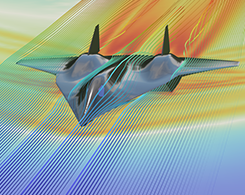
Modeling the Speed and Stealth of the Darkstar
What would the shock waves around the Darkstar really look like at Mach 7.5? How stealthy is this hypersonic jet? Here, we use modeling and simulation to find out.
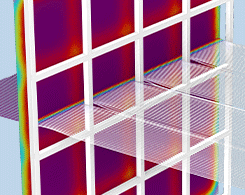
Examining an Air Filter with a RANS Turbulence Model
Modeling and simulation can be used to analyze and better understand turbulent flow in a variety of systems. See one example here.
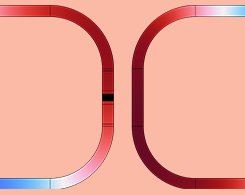
Modeling Acoustic Energy Generation in Thermoacoustic Engines
Thermoacoustic engines do not use moving parts, keeping their structure very simple. Learn more about these engines and how to model them here.
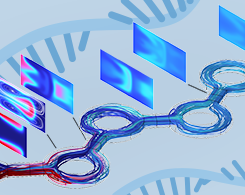
Using Simulation to Guide mRNA Vaccine Production
In recent times, lipid nanoparticles have gained public attention for their use in mRNA vaccine production. Read how Veryst Engineering is using simulation to help guide this process.
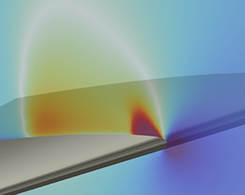
Validating Transonic Flow Results with the ONERA-M6 Wing Model
When using simulation software, your models’ results should accurately reflect the real-world phenomena you are simulating. 1 way to check this is by using a validation model.
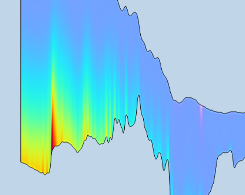
Investigating Glacier Motion with Viscoelastic Ice Simulations
Researchers at the Alfred Wegener Institute (AWI) use viscoelastic ice simulations to study the occurrence of crevasses in glaciers and iceberg calving. Learn how here.
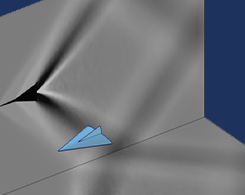
Creating Schlieren-Type Visualizations in COMSOL Multiphysics®
Did you know that Schlieren imaging might predate written history? Here, we explore this ancient imaging technique with CFD modeling.
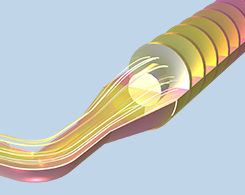
Pasta alla Simulazione: Modeling an Extruder in COMSOL®
On an industrial scale, extruders mix and knead raw pasta dough. Avoid issues with looks, taste, and safety by modeling the extrusion process.

Why Do Golf Balls Have Dimples?
Why do golf balls have dimples? Can I model a golf ball with COMSOL Multiphysics? Can I use simulation to optimize my shot and make a par? Find answers to these questions and more…
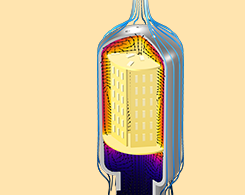
Analyzing LED Bulb Designs with Heat Transfer Simulation
LED bulbs are billed as more energy efficient than traditional bulbs, but they are not 100% efficient in turning electricity into light, making thermal management a vital design consideration.
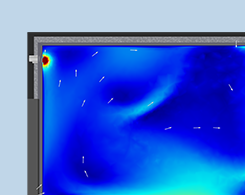
Fine-Tuning an HVAC System Design with Simulation
Do you find your office too hot, too cold, or just right? Using simulation, HVAC system engineers can assess indoor climate conditions and ensure maximum comfort among a building’s occupants.
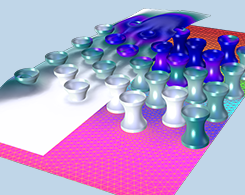
How to Compute Residence Time in Flow Models with COMSOL®
You can compute residence time in flow problems using the Particle Tracing Module. Get the details in this blog post.
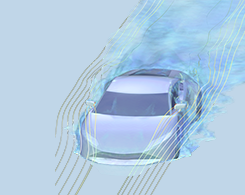
Simulating Wind Load on a Sports Car’s Side Door and Mirror
Vroom vroom: In this blog post, we use large eddy simulation (LES) and structural analysis to analyze wind loads and airflow on the door and side mirror of a sports car driving at high speeds.
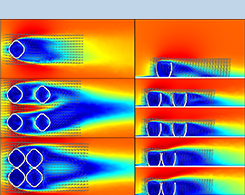
Studying a 500-Million-Year-Old Dinner Party with CFD Simulation
From zebras to elephants to lions, Namibia is home to a variety of wildlife. However, this research team was on the lookout for the fossils of a 500-million-year-old organism.
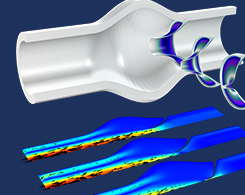
New Method for Performing Topology Optimization of FSI Problems
Many topology optimization methods are only available for FSI problems within a purely academic scope. Enter the TOBS-GT algorithm for fluid-structure design…

The Beauty of Vortex Streets
Vortex streets occur quite frequently in nature and are relevant in a variety of technical applications. This fluid mechanics phenomenon can also be quite beautiful to watch!

Modeling a Rapid Detection Test in COMSOL Multiphysics®
Curious about how exactly the rapid detection tests for COVID-19 work? Get a comprehensive explanation here, as well as 3 example models in COMSOL Multiphysics®. (Part 2 of 2)
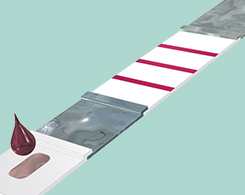
An Introduction to the Physics of Rapid Detection Tests
Rapid detection tests based on lateral flow assay (LFA), also called immunochromatographic tests, can be thought of as quite advanced, yet very robust, microlaboratories. (Part 1 of 2)
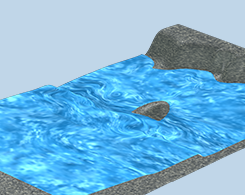
Analyzing Tsunami Waves with an Established Benchmark Model
The 1993 Hokkaidō earthquake in Japan caused tsunami waves that reached massive runup heights — one recorded wave in Monai Valley even reached as high as 32 m (~104 ft)!
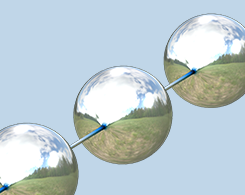
Modeling the Behavior of an Oldroyd-B Polymer
Have you ever noticed that when a certain force is applied to a viscoelastic fluid, the fluid starts to look like beads on a string? Here, we showcase an example that uses an Oldroyd-B polymer.
